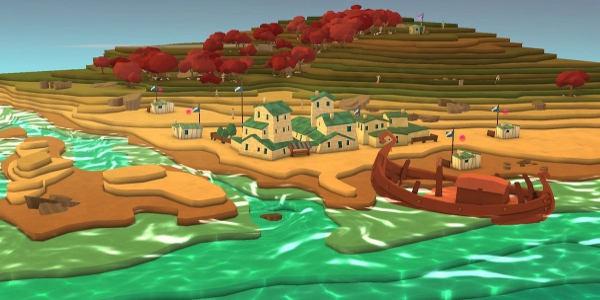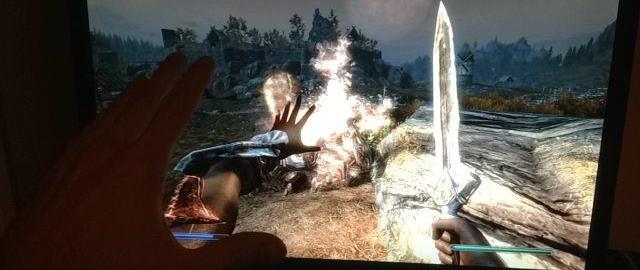 Another week passes and I come up for air, catching up on the latest game news. And again, here’s a rundown of the most tingle-inducing bits. Homeworld is back, Godus goes up in my estimation and a new player enters the motion controller market.
Another week passes and I come up for air, catching up on the latest game news. And again, here’s a rundown of the most tingle-inducing bits. Homeworld is back, Godus goes up in my estimation and a new player enters the motion controller market.
Homeworld: Back in safe hands
When THQ went belly up earlier this year and sold off their properties the beloved Homeworld went to Gearbox. The news that Homeworld might live on was tempered by… well, it was Gearbox. Duke Nukem Forever Gearbox. But rejoice! Gearbox have handed development of the next game in the series to Blackbird Interactive, a studio formed in part of former Homeworld devs. Blackbird were already working on a “spiritual successor” called Hardware: Shipbreakers, which is now the cunningly named Homeworld: Shipbreakers.
Hardware looked to be leaving the space-based part behind – at least the trailer shows a lot of planetside action, but very much in the style of the Homeworld games we know and love. Will that change now that the Homeworld name is, so to speak, home?
Godus
Ah, Peter Molyneux. He gets a lot of flak, but quite frankly I loved Populous, I had a deep respect for the AI and the world in Black and White, and Fable 3 was – if not as astounding as he might have liked – an awful lot of fun. So when he and his new studio 22cans announced Godus a lot of eyebrows were raised, thumbs pricked and spines tingled. “The regenesis of the God Game.” Well, he made Populous, he would know.
The game has two modes – multiplayer and single player. (There was a time when announcing a game also had multiplayer was exciting, then a time where if a game didn’t have both it was strange, and now we’re in a depressing EA themed dystopia where single player is a feature but offline single player is a privilege). In multiplayer you start with seemingly wide boundaries, but you’ll quickly run up against them and therefore your neighbours – other players, other gods. Do you go to war, hurling down cosmic wrath as you send your devout followers into battle, live in peaceful isolation, or cooperate and share lands. It’s explicitly permission-based but the kicker is that your followers aren’t under your direct control:
But the interesting thing about isolationists is that your little followers have free will. If they want to walk over to the other side, you can’t control them. You can’t tell them to do this. The little followers that you’ve built up may be different from mine, though. They may be more aggressive. They may have more free will. They may want to go over and just beat up somebody else, some other tribe. That is completely down to the people, your people versus my people. Or you can choose to go to war. War means that your people establish a base here, and they’ll start to eat and erode away at my territory. In that way you can eat away at my territory. Both of us have to agree to cooperate, and we also have to agree to go to war.
– Peter Molyneux, Rock, Paper, Shotgun interview
After the Curiosity experiment, the winner – fittingly named Bryan – was announced as the God of Gods. What’s more interesting is that players have the option to form religions and challenge Bryan and potentially take his place, adding a new level of play for the serious players. Rather than just building your corner of the world as you like, or interacting with your neighbours, the grand prize is there for the taking.
Communication is the other fascinating part of this, and has the potential to shape how players approach the game:
Once you meet and once you’ve formed an agreement, when you form an agreement, the only thing you can do is say, “What shall we do?” You have very limited communication. If you decide to cooperate, then you have full communication.
…
All I’m saying is, if I gave you the power to talk to this person at the start of the game, you would talk, and you would start obsessing about talking and making friends. If I don’t give you that power, that allows you to form a view of this person based on what they’ve done, rather than what they’ve said they’re going to do. That is a different psychological approach that you have. I think it’s going to work.
And on the nature of the single player…
Who dares to say their game is always online these days? I’m sure that if I said that on stage today, this red dot would appear on my forehead and I’d be sniped to death. So just like in Curiosity, you didn’t have to be online all the time to play Curiosity. You don’t have to be online all the time to play Godus. I don’t think that’s a feature that you will care about, playing in the offline mode. Because all these social feeds go out the window. You don’t see the other gods on this planet.
– Peter Molyneux, another Rock, Paper, Shotgun interview
The Leap Motion Controller
Ars Technica covered the Leap Motion Controller a little while ago, finding it “cool, but frustrating as hell”. More recently Ben Rose at Gaming Daily took it for a spin as a game controller. As you’d expect, some issues with accuracy and the obvious problem that if you’re using your entire arm as a primary input method you’re going to get very tired very fast:
Any more than ten minutes or so of constant gameplay quickly tired my arms to the point where I really didn’t want to play anymore, especially because I was having to constantly make small, precise movements. Even more annoyingly, the very act of moving my hands out of the interaction zone to have a rest causes inputs to fire all over the place, meaning that unless you’ve had the foresight to bind some kind of gesture to the pause function, you’re almost certainly going to run off the edge of something before you can hit ESC.
However, just as the Kinect didn’t really take off as a full-body controller but did very when used as a supplementary controller (voice commands, intermittent gestures, HUD controls and so on), it looks like the Leap will really shine in that space. Consistent use of one arm for input will be tiring, but making occasional gestures to perform less common tasks might well be both fun and immersive.
So, my attempts to use the Leap as a game controller in its own right ended up being too frustrating. I then toyed with the idea of using it only for specific inputs that make intuitive, tactile sense. The software works a lot better when it’s only having to register one or two gestures, rather than a whole controller’s worth and, honestly, there’s nothing quite like the feeling of throwing your hands forward to use force powers in Jedi Academy, or cast offensive spells in Skyrim.
I really hope the Leap takes off and gets some traction, because if enough devs get on board the possibilities are seriously exciting.



